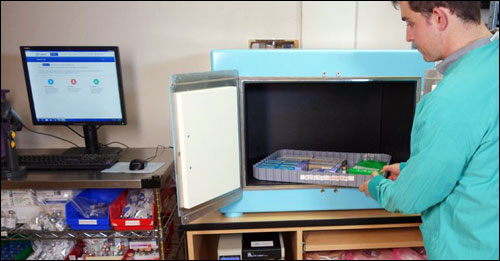Kit Check just raised a $15 million Series C to help the team achieve its goal of streamlining the way hospitals do business with pharmacies. While not unheard of, this is a big raise by D.C. standards.
The round was led by Baxter Ventures, the venture arm of Chicago-area healthcare company Baxter, with participation from new investor Black Granite Capital and existing investors Kaiser Permanente Ventures, Rex Health Ventures, New Leaf Venture Partners, Easton Capital Investment Group, LionBird and Sands Capital Ventures. The latest raise brings the four-year-old company’s total investment to $37.4 million.
Kit Check will use the money to grow its product and sales teams. It currently employs 73, most of whom work out of the company’s new-ish 13,000-square-foot Dupont Circle office, said Chief Marketing Officer Bret Kinsella. (Last fall, Kit Check moved to the office, a former Uber driver support center. Not all the Uber drivers got the memo about the office switch.)

Kit Check’s business focuses on pharmacy kits, a link between hospitals and pharmacies. Kits are groups of medications and items sent to a hospital for patients. But since medications are rarely used in full and leave holes in kits for the next use, a pharmacy technician has to manually refill them.
Kit Check strives to do away with that frustration by automating the process with software. The company provides a scanning station and software that uses RFID (Radio Frequency Identification) technology to scan medication and record what is missing, expired or incorrect. The software and scanning station, which are installed in hospitals, ease the usual kit-checking process by turning a task that typically takes 30 minutes into one that only requires three-to-five minutes, the company says. This allows healthcare professionals to dedicate more time to clinical tasks and other aspects of their job.
Kevin MacDonald, the company’s 37-year-old cofounder and CEO, says that Kit Check was founded to be a “friend to the hospital pharmacist,” one that reduces the risk of human error.
“We know humans make mistakes,” MacDonald said. “They get interrupted. They get distracted.”
He said that his team typically sees 5 to 35 percent of manually-stocked pharmacy kits go out to healthcare providers with errors, like kits that include the wrong drug or an expired drug. That’s why automation is so helpful in this case.
Georgetown University’s MedStar Hospital and New York University’s Langone Medical Center are two of the names on its 250-hospital client list.
Kit Check charges providers as medications are tracked and consumed in the hospital. As each tag is read by the RFID scanner, Kit Check makes money.

The company was born out of a dinner conversation between MacDonald and a friend of his wife, a registered pharmacist in a large research hospital in Baltimore. She spoke about spending two days mulling over pharmacy kits for accuracy, one medication at a time.
MacDonald, who had spent the last 10 years working with RFID, thought that there must be an easier way to streamline the process and make it less tedious for medical professionals.
MacDonald contacted his friend and now cofounder, Tim Kress-Spatz, who was working in large-scale systems on Wall Street, to discuss a possible technology solution. Kit Check was launched in 2012 at the University of Maryland and at NYU later that same year. Kress-Spatz, 35, moved to D.C. the following year, after the company raised a $10.4 million Series A.
Kit Check uses cloud software and the Internet of Things — a system of devices, objects or things that are given unique identifiers that have the ability to send and receive data without human interaction. Kit Check believes it has the largest IoT installation in hospitals worldwide.
Up next, Kit Check is looking to automate other processes related to the medication life cycle, in response to demand from its customers. It recently developed a new automation system called “Narc Check” for controlled substances.
Kit Check is also particularly proud of its involvement in community affairs. Staff members have prepared meals for Food & Friends and the company has supported a local Girls Who Code program.
MacDonald is excited about this next stage of growth for Kit Check.
“We think of our customers as part of our extended family and we like growing our family,” he said.
Meet Kit Check, ‘a friend to hospital pharmacists’ that just raised $15 million







